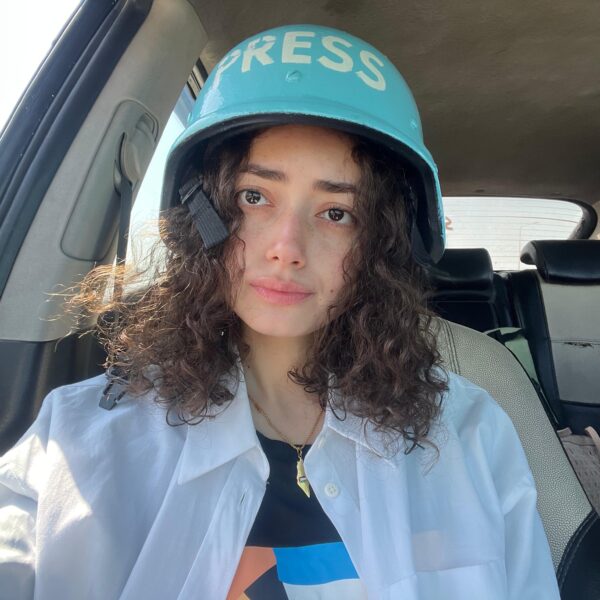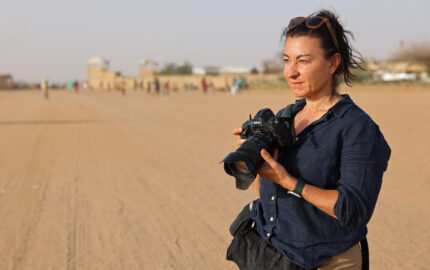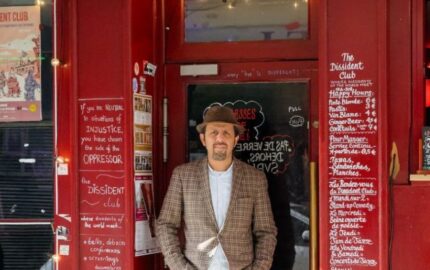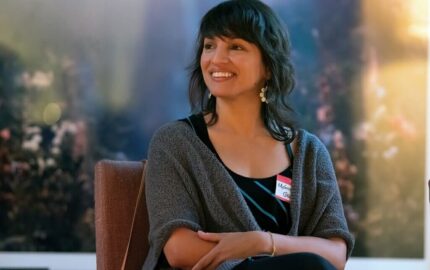When Israel began its bombardment of Gaza in October 2023, Plestia Alaqad, an aspiring reporter, was just 21. Overnight, she went from being a recent journalism graduate to one of Gaza's most widely followed witnesses to the devastation as it unraveled on the ground.
Through her videos and diary-like posts on Instagram, she gave millions a visceral glimpse into life under siege. As her following soared, she reported from hospitals, shared the wreckage left by airstrikes, documented daily routines of survival, and conveyed the grief of seeing streets she once walked reduced to rubble, all while she herself faced displacement and hunger.
In doing so, Alaqad joined a generation of Palestinian journalists — among them Bisan Owda, Hind Khoudary, and Motaz Azaiza — who emerged not through traditional newsrooms but rather through the immediacy of social media platforms. Alaqad’s new book, “The Eyes of Gaza: A Diary of Resilience,” published in September 2025 by Little, Brown and Company, expands on her dispatches in diary form, blending raw, personal testimony with historical record.
The book’s release comes amid what the Committee to Protect Journalists has called the deadliest period on record for journalists since it started compiling such data in 1992, with nearly 240 journalists and media workers — the vast majority of them Palestinians in Gaza — killed by Israeli fire since October 2023.
In this conversation with Nieman Reports, Alaqad reflected on what it means to write as both a witness and a survivor, the challenges of reporting to a digital audience of millions, and the responsibilities she feels in carrying Gaza with her in exile in Beirut. She also discusses her view that international media coverage of Gaza often fails to center Palestinian experiences. It has been lightly edited for clarity.
It feels surreal, to be honest. What started as personal notes and small updates grew into something much bigger than me. When I realized people were looking to my words not just for my story but for Gaza’s story, I felt a huge responsibility to keep raising awareness and sharing the truth. Turning that into a book means carrying the voices of so many around me, and I see it less as my journey and more as a way to make sure our stories live on.
Journalism in Gaza has never felt like just a career path to me. It has always been a mission. Outside of Gaza, people often have the privilege to choose their majors based purely on passion, but in Gaza choices are shaped by mission and purpose. That is why I pursued journalism, not only as something I cared about, but as a responsibility. It became a way to give voice to stories that might otherwise remain unheard, and that sense of mission guided every step I took while reporting on the ground.
It is overwhelming for Palestinian journalists to report on a genocide that is happening to their own people and loved ones while also surviving it. While documenting starvation, they are enduring it themselves, carrying grief and fear while still trying to stay strong enough to tell the story. Balancing survival with the duty to witness and report has become one of the greatest challenges of this journey.
In my book, I spoke about how Western media often dehumanizes Palestinians in the way our stories are reported. Meaning, instead of showing us as people with full lives, families, dreams, and struggles, the coverage too often reduces us to numbers or stereotypes. For example, even today many media outlets fail to call things by their name, choosing to describe it as a “conflict” instead of acknowledging it as a genocide.
Journalism is supposed to be a profession, not a crime, yet in Gaza it is so often treated as one. Belal Jadallah was the father of journalism in Gaza, the person who dedicated his life to teaching journalists how to stay safe and protect themselves in one of the most dangerous places to report. And yet, Israel killed him in cold blood. His death left me shaken, questioning how the very man who knew every safety measure by heart, who embodied the principles of our work, could still be deliberately targeted. It was a brutal reminder that in Gaza, no amount of knowledge or precaution can shield journalists or media figures.
"Instead of showing us as people with full lives, families, dreams, and struggles, the coverage too often reduces us to numbers or stereotypes."
— Plestia Alaqad, Palestinian journalist and author
It felt like a huge responsibility, especially knowing that so often foreign media speaks about us but rarely do Palestinians get to speak for ourselves. I was living it firsthand and sharing with the world what was happening around me, and in those moments there was nothing to fact-check — I was reporting my own reality as it unfolded.
The biggest challenge was realizing that my personal diary won’t be mine alone, and anyone can buy it now and read it. Also, in the editing part, it was really emotionally challenging to go back and read and revisit all these memories.
Palestinians are the ones living this genocide, so it must be us who bear witness and tell our own stories. No one can capture our reality better than those experiencing it, and our role as journalists is to protect our truth, preserve our memory, and ensure the world hears our voices directly.
I hope they will one day report not on destruction, but on the rebuilding of their homeland. My wish for them is that their work will focus on stories of recovery, growth, and hope rather than constant loss.
That we are simply human beings with dreams, hopes, and everyday lives, just like anyone else.
The international press community must take concrete steps to protect journalists. That means holding Israel accountable for targeting reporters, demanding independent investigations, refusing to normalize or excuse these attacks, and ensuring that the killing of journalists is brought to an end.
My message to the international media is to tell the truth with honesty and humanity. After two years of genocide, the truth is too loud to be ignored.
An excerpt from "The Eyes of Gaza" by Plestia Alaqad
An excerpt from "The Eyes of Gaza: A Diary of Resilience" by Plestia Alaqad (Little, Brown and Company, 2025), used with permission from the publisher.
7 October 2023
Day 1 | SATURDAY 7 OCTOBER
I’m still half asleep when I wake up to a flurry of messages on my phone.
Friends, group chats, the company I work at. I skim through messages, barely paying attention, with my eyes still bleary from sleep. Nothing really catches my attention. There’s mention of a bombing, but that’s not unusual in the Gaza Strip. And so, with little strength or motivation to stay awake, I go back to sleep.
When I wake up later that day, my phone is still blowing up with notifications. This time, I check online:
‘Israel-Palestine escalation updates: Gaza under bombardment’ Al Jazeera
‘People are fearful of what’s to come: Gaza civilians flee waves of Israeli strikes’ The Guardian
‘More than 250 bodies found at site of Israeli Supernova festival – rescuers’ BBC News
Palestinian fighters have executed a raid on Israel near the Gaza Strip, killing over a thousand people and taking a couple of hundred more hostage.
I leave my room and go to talk to my mom, but she’s on the phone with the delivery guy, giving him an endless grocery list. At that moment, I understand how serious the situation is. I’m four Israeli Aggressions old, so I’m familiar with what the steps taken during an emergency situation look like. One: you start stocking your house with bread, flour and lots of groceries. Two: you open the windows a little bit so they won’t break from the pressure released by bombs and airstrikes. Three: you prepare a small bag that has the passports and all the important documents and you put it near the door so if you have to evacuate, you just grab it and run. Four: you move mattresses to a part of the house that doesn’t have windows and you sleep there.
Palestine has been occupied by Israel for almost seventy-five years. Palestinians have been raided, killed and taken hostage by the IOF every month for 900 months. This is the first time the opposite has happened. I’m shocked, and I don’t know what to feel. I’m conflicted. History didn’t start today.
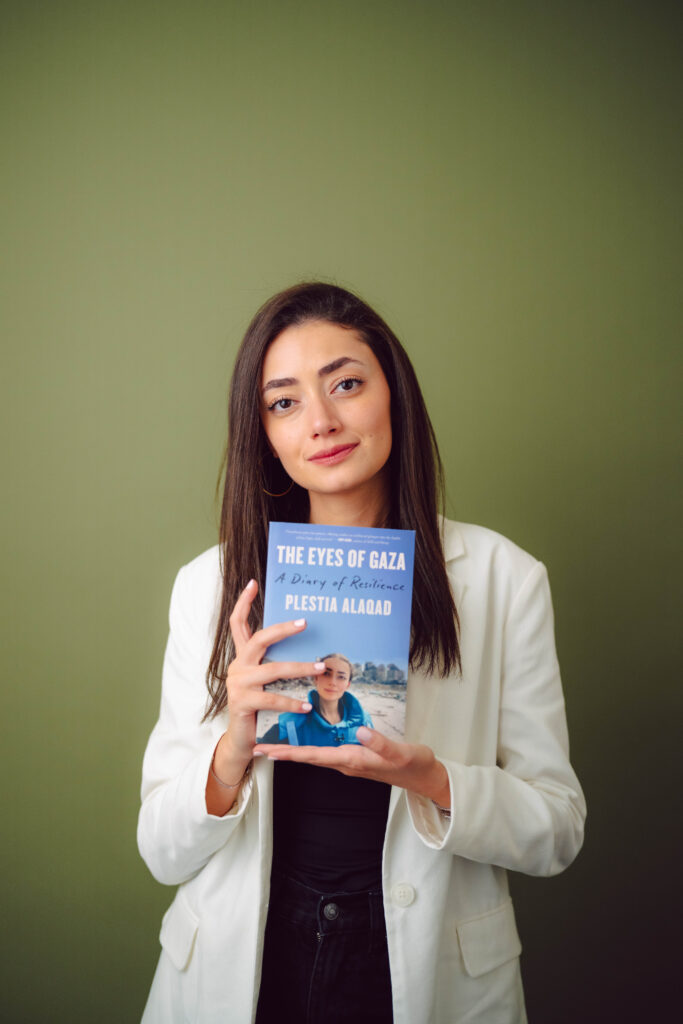
It’s around 11 a.m., and I look from the window towards Al-Rayaheen market across the street – it’s a landmark in my neighbourhood, where everyone goes to shop, the kind of place where you can always buy on credit because the shopkeeper has known you all your life. Now, all I can see are neighbours rushing in and out with bags full of groceries, not stopping to chat to anyone. I can tell that emergency mode has been initiated in every house.
My phone rings; it’s my colleague asking if he can share my number with a journalist, Mohamed Abu Safieh. I agree.
Mohamed calls me later that day and asks me to send him a minute-long video, in English, reporting on what’s happening. He tells me it’s a chance to work with a British television channel.
I agree and immediately sit down to write a report. I ask my sister Judy to film me on the balcony of my teta’s (grandmother’s) house next door. We start filming, and my teta is screaming in the background: ‘Come back in the house, it’s dangerous out there’, but we ignore her (sorry, teta) and shoot the video regardless. I send it to Mohamed, and he tells me that the news channel wants me live on air for five minutes tomorrow morning. Without thinking twice about it, I tell him yes; I’m excited that I’ll get the chance to have my voice heard as a Palestinian. It’s rare that we get a platform to talk about our own home; usually, others speak on our behalf.
While discussing today’s news – which is an activity that’s happening in almost every household around us – mama tells us that she fears history is repeating itself. In 1948, during the first Arab–Israeli war, Palestinians fled their homes and left their whole lives behind, with only a glimmer of hope that they would return one day. My grandparents were there, and have told me stories about Al-Nakba (the ethnic cleansing and enforced displacement of Palestinians) since I was a little child.
When I share the same stories with my grandkids, I hope it will be in the presence of a Free Palestine. The chatter about Al-Nakba brings to my mind the previous Aggression on Gaza, a few years ago.
